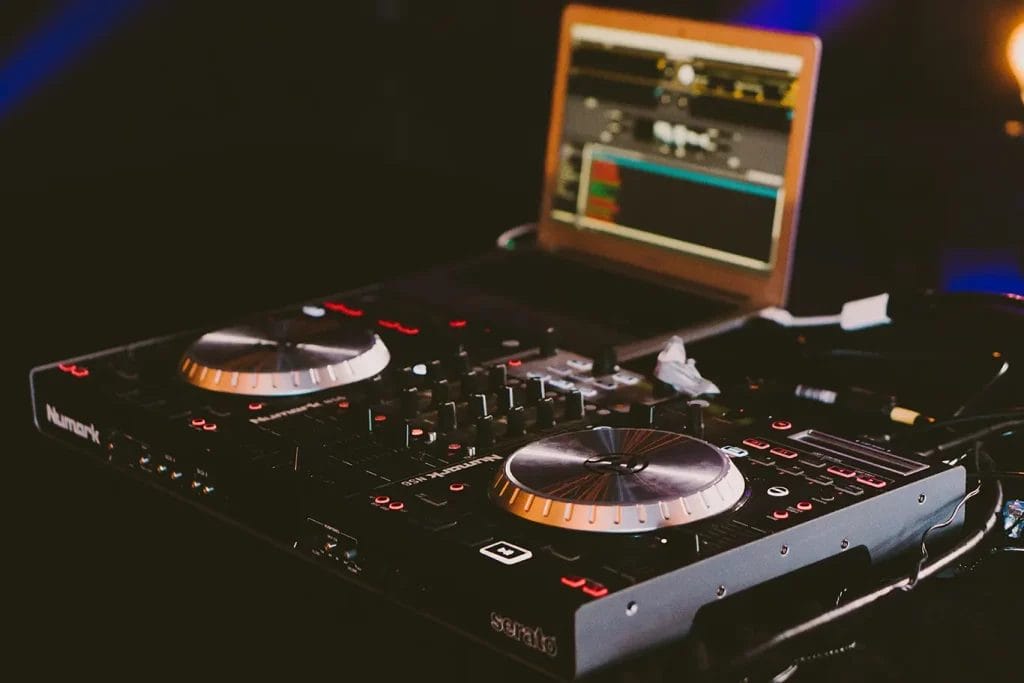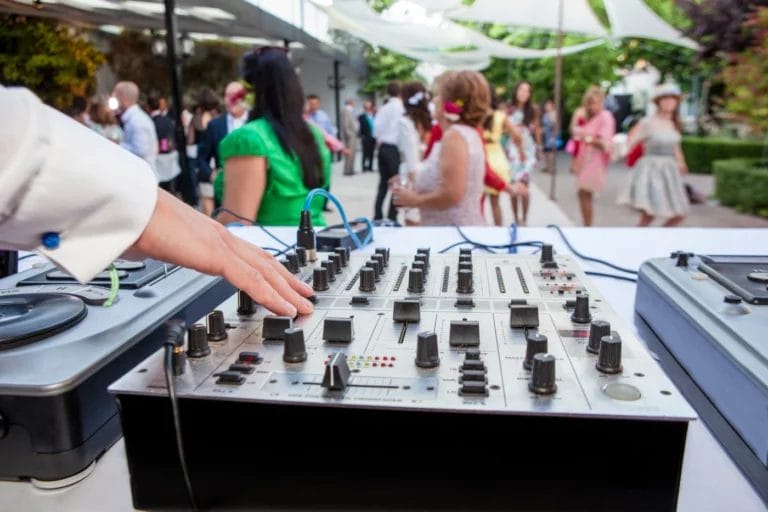As a DJ, you’re the life of the party. Remixing and developing unique tracks is your forte. Making sure everyone else is having a good time is your number one goal. While being a DJ is a fun and exciting job, it also comes with a unique set of risks you should be aware of.
Knowing what might go wrong is the first step towards prevention, which is why we’re sharing the most common risks DJs face and how you can avoid them. We’ll also cover how to protect yourself in the event one happens to you with a DJ liability policy from Insurance Canopy. This includes real examples of claims our DJ policyholders have filed with us and how insurance shielded them from paying out of pocket.
Armed with knowledge, you’ll be able to prepare as best you can for the incidents you’re most likely to face in your line of work.
1. Having Your DJ Equipment Get Damaged
Without your equipment, it’s impossible to do your job. However, damage to equipment is common and often out of your control. Accidents can happen at a show, on the road, or even in the studio.
How to Prepare
- Weatherproof your DJ gear: This is especially important when you’re playing outdoor gigs and the weather is unpredictable. It might be a good idea to invest in a waterproof tent you can set up overhead, or you can go with a budget option and wrap your speakers in large plastic garbage bags. What you lose in sound quality you’ll make up for by not having to purchase new speakers.
- Add tools and equipment coverage to your liability policy: Insurance can help mitigate or even eliminate the cost of repairing or replacing damaged equipment. One DJ reported that their equipment was damaged at a New Year’s Eve party when guests popped open and sprayed a bottle of champagne nearby. By adding DJ equipment insurance to their DJ general liability insurance policy (with our tools and equipment coverage) their policy covered the $4,166 repair cost.

2. Getting a Noise Complaint
How to Prepare
- Familiarize yourself with local noise codes: Many areas have noise ordinances that regulate how loud you can be at different times of day and in different zoned areas. For example, a certain level of noise may be acceptable in a commercial district after 9:00 PM but would not be acceptable at the same time in a residential area.
- Give neighbors a heads up: If you’re going to be DJing a house party, whether at your place or someone else’s, give the neighbors advance notice about the party. Let them know that you’ll be keeping the volume within your local noise code, but that if things get too noisy they should feel comfortable knocking on your door and letting you know. Doing them a simple courtesy like this could mean the difference between a slightly awkward conversation with a neighbor and the police showing up.
- Use headphones when DJing at home: If you aren’t playing for other people, use a high-quality pair of DJ headphones while you work. You’ll be able to hear your music well without worrying about anyone else hearing it too.
3. Causing a Trip-and-Fall Accident
How to Prepare
- Properly tape down your cables: If you can avoid running your cables through areas where you know there will be a lot of foot traffic, it’s always best to do so. If you can’t, make sure you use plenty of tape to hold the cords down (there’s no such thing as over-taping in a high-traffic area).
- Keep a tidy space: Don’t leave boxes, crates, or gear lying around unattended. These are easy tripping hazards. Make sure you keep your space clean and organized and move anything you aren’t using to a secure location where it won’t be in anyone’s way.
- Shield yourself from claims with DJ liability insurance: In the event someone does trip and fall because of your equipment, liability insurance can offer coverage in case that individual tries to hold you liable for any injuries or damages caused. For example, one wedding DJ was hit with a claim from a guest after they tripped over some equipment and received a laceration on their forehead. Insurance Canopy was there to cover the $4,016 the claimant was seeking for their injuries.
4. Not Getting Paid for a Gig
How to Prepare
- Insist on a contract: It can be extremely difficult to prove that you weren’t properly compensated for your services if you have nothing in writing to show that the person who hired you agreed to pay you a certain amount. It may be worth your while to work with a contract lawyer to develop a document you can present to club managers or clients so you have a legally binding agreement in case things go wrong.

5. Damaging the Venue’s Property
Even if you aren’t playing a particularly rowdy set, there’s always a chance you may accidentally damage the property of the venue you’re playing. It’s not uncommon for a DJ to file a claim stating that the venue accused them of scratching their floor while they were moving their equipment around. You can be held liable for any property damage that your equipment may cause—intentional or not.
How to Prepare
- Be mindful with your equipment: When moving or unloading your gear at a venue, try to be careful not to bump it into walls or scrape it along the floor. Move it with care to avoid causing unnecessary damage to the space. Add felt pads to the bottom of your gear to minimize the risk of scratching surfaces when you need to move it.
- Get general liability insurance: Even when you try to be careful, you may still accidentally damage the venue’s property. For instance, one DJ was hit with a claim from a wedding venue owner after they used gaffer tape on a deck to hold cords in place. When the DJ removed the tape, the paint on the deck came off with it. Insurance Canopy covered the claim for $416.
6. Your Equipment Failing at a Gig
Every DJ’s nightmare: your DJ software crashes, your controller won’t work, you get a weird error on your laptop that you’ve never seen before… the list goes on and on. With the amount of tech and gear that you use, the odds are something might go wrong with it at a gig.
How to Prepare
- Bring a backup: While it isn’t feasible to bring a backup for every piece of equipment you own, it’s a good idea to do so whenever you can. For example, bringing a backup controller is easier now than ever before because they’ve gotten less expensive and more portable over time, like the Numark DJ2GO2. This is easy to pack in your bag—the only downside is having to pay for a second controller.
- Test your gear before you go: The night before your gig, make sure everything is in working order. This is especially important to do in case you have done any software updates recently. Give yourself plenty of time to troubleshoot in case you need it.

7. Getting Your DJ Equipment Stolen
How to Prepare
- Store your equipment in a secure location: Always make sure your gear is in a locked room when not in use so no one else has access to it. Try to avoid leaving it in your unattended vehicle whenever possible, even if the doors are locked, as thieves can easily break the windows to grab your equipment.
- Be prepared with tools and equipment insurance: Sometimes you take all the precautions you can and your gear still gets stolen. DJ equipment insurance can help mitigate or even cover the cost of replacing your stolen gear as long as you use reasonable and appropriate caution to protect your property. One policyholder reported $3,263 in stolen equipment and Insurance Canopy covered the cost.
Safeguard Yourself with DJ Liability Insurance
Now that you know some of the most common risks DJs face, you can take steps to prevent these incidents from happening to you. However, sometimes accidents still happen no matter how much you try to avoid them. That’s where DJ liability insurance comes in.
Insurance Canopy offers an annual liability insurance policy for DJs starting at just $18.50 per month or $192 per year. This includes coverage for general liability, personal and advertising injury, and damage to premises rented to you.
Alternatively, if you only need short-term coverage for a single show, we offer an event policy starting as low as $59 for three days of coverage. Having multiple days of coverage ensures that you’re protected during set-up and teardown days, should you need them.
If an annual policy is right for you, we highly recommend that you add tools and equipment coverage during checkout. This optional coverage is designed to protect your gear (speakers, turntables, monitors, etc.) in case it is damaged or stolen. This coverage is only available for annual policyholders.
Having insurance can give you the peace of mind you need to focus on keeping the party going wherever you play. Know the risks, take steps to prepare, and protect your DJing livelihood with insurance from Insurance Canopy!





